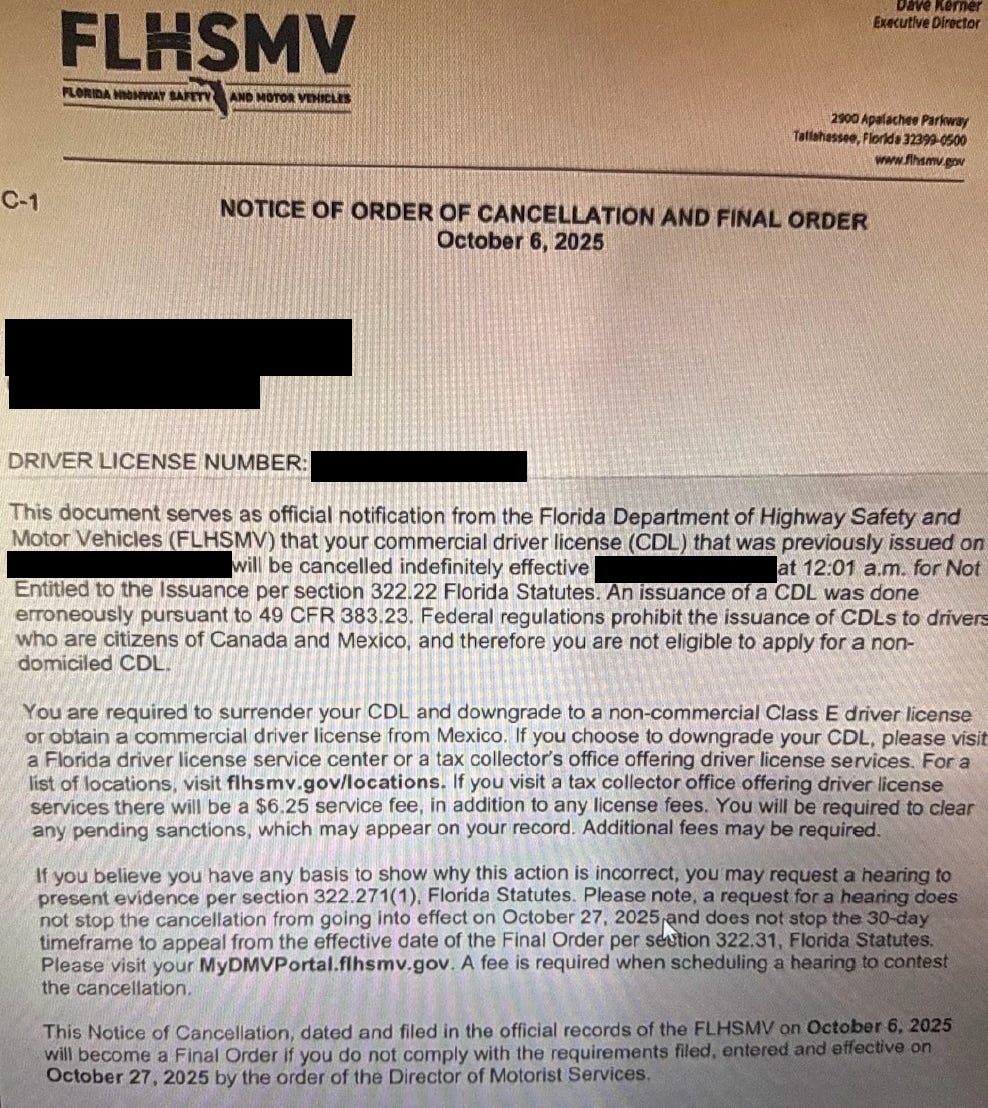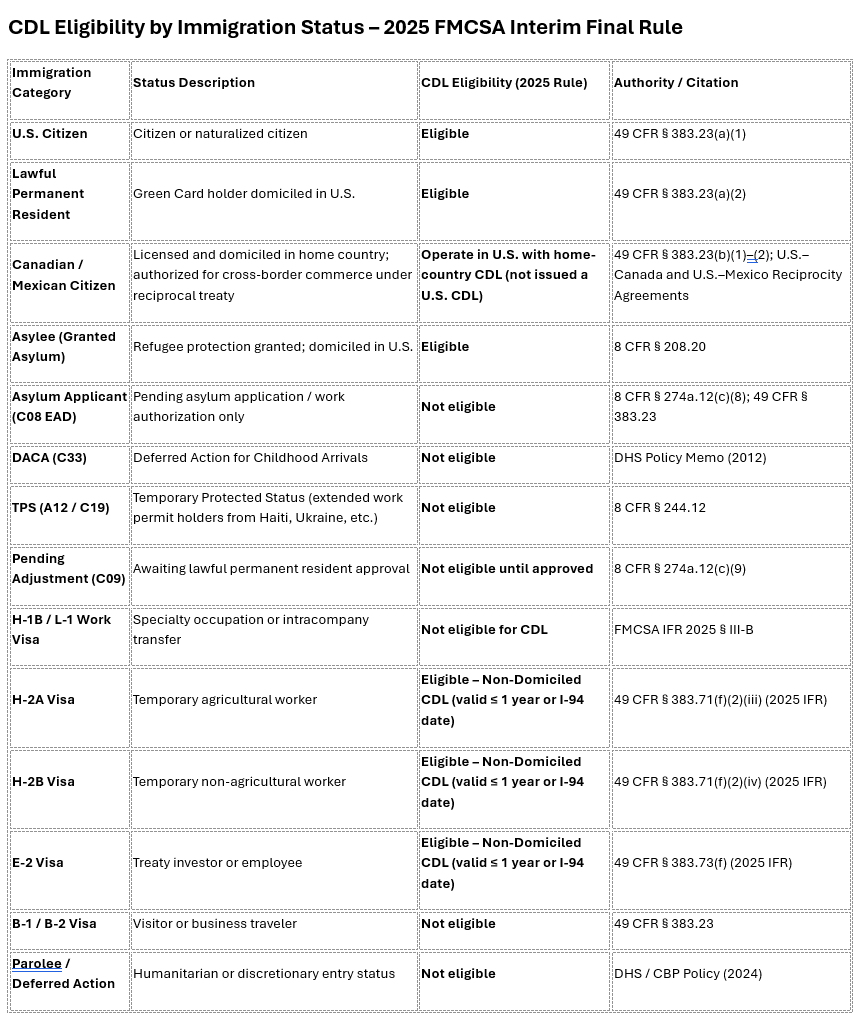Who Can, and Can’t, Hold a CDL in 2025 and What Fleets Need to Know
The 101 Guide to The New FMCSA Rule on Immigration Status, Work Authorization, and “Non-Domiciled” Drivers
So your drivers are getting letters like this, and you’re confused. Who can we hire? What work authorizations are ok, which aren’t? Well, this is for you.
The U.S. Department of Transportation issued a new rule that changes who can and cannot legally hold a CDL in the United States. The 2025 FMCSA Interim Final Rule titled Restoring Integrity to the Issuance of Non-Domiciled Commercial Driver’s Licenses (Docket No. FMCSA-2025-0622) tightens CDL eligibility for non-U.S. citizens after federal audits revealed that several state licensing agencies had issued CDLs to drivers who were not legally eligible under federal domicile standards.
For carriers, compliance teams, and safety departments, this rule directly affects hiring practices, driver qualification files, and exposure in the event of an audit or crash.
Under 49 CFR 383.23(a), a state may issue a CDL only to an individual domiciled in that state. “Domicile,” defined in 49 CFR 383.5, means a person’s actual, fixed, and permanent home, the place they intend to return to.
The only federal exception, found in 49 CFR 383.23(b), allows a non-domiciled CDL for citizens of Canada or Mexico who are domiciled in their home country and operate in the United States for cross-border commerce. Beyond those two nations, no other foreign nationals qualify for a non-domiciled CDL.
Many drivers are lawfully present in the United States but not domiciled here. The U.S. Citizenship and Immigration Services (USCIS) issues Employment Authorization Documents (EADs) under 8 CFR 274a.Category 12, such as C08, for asylum applicants. These cards grant permission to work but do not establish permanent residency or domicile.
Before 2025, some states accepted temporary EADs as sufficient documentation for CDL issuance. The new federal rule eliminates that practice nationwide. An EAD now confirms only temporary work authorization, not eligibility for a commercial driver’s license.
Effective January 2025, FMCSA amended 49 CFR Parts 383 and 384 to restore consistency among states and close longstanding compliance gaps. The rule requires:
States must verify lawful status through the DHS SAVE system and retain confirmation for at least two years.
A non-domiciled CDL may be issued only to specific visa categories listed in the regulation.
Every non-domiciled CDL must expire on the earlier of the driver’s I-94 expiration date or one year from issuance.
If DHS, FMCSA, or the State Department notifies a state that an individual’s lawful status has ended, the state must downgrade or cancel the CDL within thirty days.
What about Temporary Protective Status? Drivers from war-torn or disaster-designated nations such as Ukraine, Haiti, Venezuela, Sudan, and Afghanistan often receive Temporary Protected Status (TPS), which allows them to live and work in the United States temporarily. In many cases, DHS automatically extends its work permits for 18 months at a time.
TPS remains a temporary humanitarian designation under 8 U.S.C. 1254a and 8 CFR 244.12. It does not establish lawful domicile. Under the 2025 FMCSA Interim Final Rule, CDL eligibility is based on lawful status and domicile, not the printed expiration date of an EAD.
Even if DHS extends a TPS card or grants deferred enforcement, those individuals are still classified as temporarily present and are therefore ineligible for a CDL. States must cancel or downgrade any CDL tied to an expired or temporary TPS record once DHS SAVE verification expires or lawful status cannot be confirmed.
This distinction is critical for fleets reviewing driver files. The key question is not whether the driver can work, but whether their immigration status establishes domicile under 49 CFR 383.23.
Federal and state audits uncovered that multiple jurisdictions were issuing CDLs to foreign nationals on temporary or humanitarian statuses that did not meet the domicile requirement. FMCSA determined that inconsistent “lawful presence” checks and SAVE verifications created systemic vulnerabilities in the CDL program.
The agency’s fix was to narrow eligibility to a clear, verifiable list of visa classes, H-2A, H-2B, and E-2, along with Canadian and Mexican cross-border drivers. The goal, according to the rule preamble, is to restore integrity and standardize CDL issuance across all fifty states.
Carriers should act immediately to ensure compliance with the new rule:
Review all driver qualification files for non-U.S. citizens holding CDLs.
Verify lawful permanent residency through I-9 documentation and DHS SAVE.
Reassign or remove any driver whose CDL was issued under a temporary or asylum-based EAD category.
Monitor state correspondence for downgrade or cancellation notices issued under 49 CFR 384.231.
Retain documentation of these verifications for audit defensibility and insurance purposes.
A driver operating with an ineligible CDL is considered disqualified under 49 CFR 383.37, and any carrier employing that driver may face civil penalties, audit findings, or exposure in post-crash litigation.
Federal law now draws a sharp, enforceable line between lawful presence and lawful domicile. Only U.S. citizens, lawful permanent residents, and a short list of foreign nationals, Canadian and Mexican cross-border operators, H-2A and H-2B seasonal workers, and E-2 treaty investors can legally obtain a commercial driver’s license.
Asylum applicants, DACA recipients, TPS beneficiaries, parolees, and most temporary visa holders may be lawfully present and permitted to work in the United States. Still, they are no longer eligible to hold or renew a CDL under the 2025 FMCSA rule.
For fleets, this isn’t just a policy update. It’s a shift in how eligibility, compliance, and defensibility intersect, and it’s critical to make sure every CDL in your fleet was issued under the law, not by mistake.
Reference
• 49 CFR Parts 383 and 384 (Amended 2025) – Docket No. FMCSA-2025-0622, Restoring Integrity to the Issuance of Non-Domiciled Commercial Driver’s Licenses.
• 8 CFR 274a.12 – Classes of Aliens Authorized to Accept Employment.
• 8 CFR 208.20 – Asylum Status and Employment Authorization.
• 8 CFR 244.12 – Temporary Protected Status.
• FMCSA Compliance Bulletins 2022-04 and 2023-02 – CDL Eligibility Clarifications.
• DHS SAVE Program Guide, 2024 Edition.



